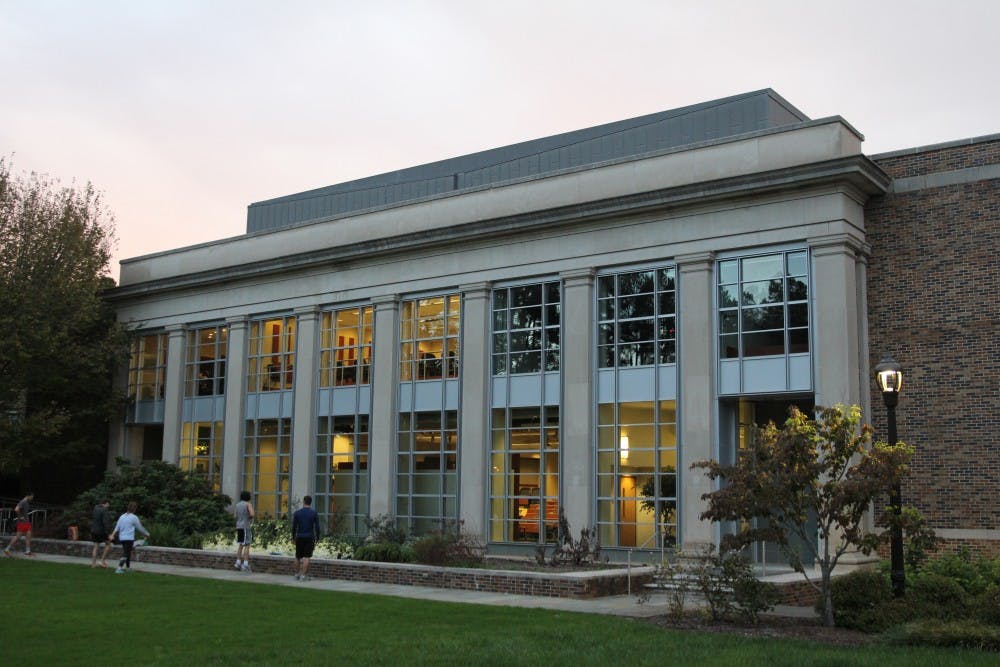Can data collection and analysis uncover solutions to entrenched problems of our criminal justice system? The new interdisciplinary Duke Center for Science and Justice aims to find out.
As director of the center, Brandon Garrett, L. Neil Williams, Jr. professor of law, plans to continue his research on wrongful convictions and risk assessment. He also teaches a criminal justice policy lab course at Duke Law, in which students will work directly with the center to develop proposals for criminal justice reform.
Garrett wrote in an email that he hopes that the center will pursue research that is “impactful and performs a public service” in order to “be a model for how to do research, policy and education at the intersection of science and law.”
Last year, Garrett researched driver’s license suspensions, a problem that impacts over one million people in North Carolina. His work highlights the disproportionate effect these suspensions have for people of color. According to his research, 41% of suspensions are for black drivers, but the black driving-age population is just 21% of all North Carolinians.
The center’s research priorities include patterns in juvenile life without parole sentences, risk assessment, eyewitness identifications, DNA exonerations and jury evaluations of forensic evidence.
Incorporating a database on DNA exonerations that he maintains, Garrett wrote that the center also plans to expand practical research in collaboration with the government at the national level in addition to building on prior work.
In addition to political and legal expertise on the team, the center is building collaborations with medical professionals and integrating scientific research with policy research priorities.
The team also includes postdoctoral research fellows Karima Modjadidi and Will Crozier; J.D. and Ph.D. candidate Kristen Renberg; and Ph.D. candidates Arvind Krishnamurthy and Catherine Grodensky.
“A strength of the center is that it already includes researchers from Duke’s department of psychiatry and behavioral sciences and department of population health sciences,” Grodensky wrote in an email. “Collaborations between these departments and law and public policy will certainly foster scientific development and application of novel scientific methods to justice issues.”
Grodensky herself has 12 years of experience in health services research. At the University of North Carolina at Chapel Hill School of Medicine, her work focused on health care for prison and jail populations. Using scientific research methods, she wrote that she aims to “understand and address the drivers of mass incarceration.”
Additionally, Garrett noted that the center’s postdoctoral fellows are both psychologists, and a team at the Duke School of Medicine’s psychiatry department will also assist the center’s scientific research. Those in psychology, statistics and social work will endeavor towards “cutting edge eyewitness evidence research,” he wrote.
“The center seems like the kind of interdisciplinary site with the ability to produce valuable scientific and empirical research that influences lawmakers, industry and academia across a variety of disciplines,” Krishnamurthy wrote in an email.
Krishnamurthy expanded that the center is collaborating with the center for statistics and applications to forensic evidence and the science and society initiative at Duke, including a new amicus lab course focused on science and technology briefs for law students.
“We have some of the most impressive scholars in the world here at Duke, an interdisciplinary approach towards research and a dedication to public service,” Garrett wrote. “Duke is an ideal place to work collaboratively to solve major social problems, and few loom as large as the challenges our criminal system face.”
Get The Chronicle straight to your inbox
Signup for our weekly newsletter. Cancel at any time.

